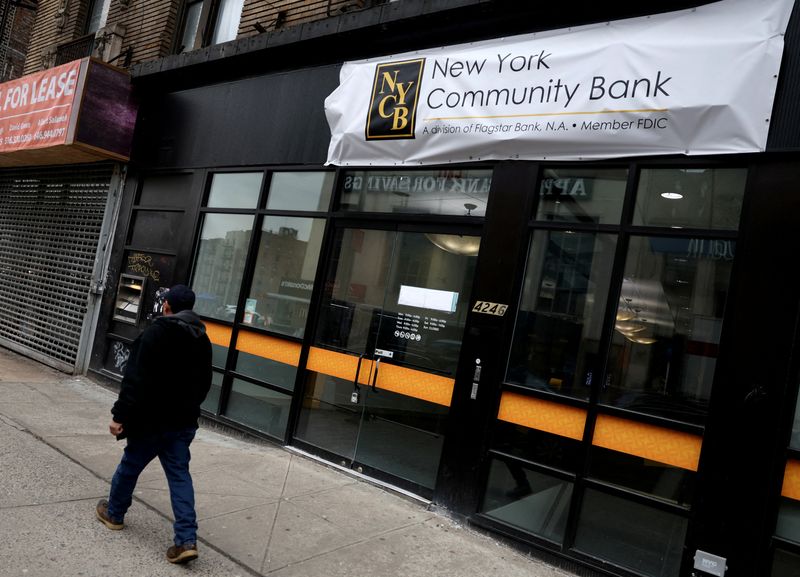By Niket Nishant and Saeed Azhar
WASHINGTON (Reuters) -U.S. regional banks sold off again on Thursday, adding to losses from a day earlier when New York Community Bancorp (NYSE:NYCB) reported increased stress in its commercial real estate portfolio, renewing fears about the industry's health.
The KBW Regional Banking Index fell 2.3%, after seeing its biggest single-day decline since the collapse of Signature Bank (OTC:SBNY) in March 2023.
NYCB shares lost another 11.1% of their value and closed at $5.75. The stock experienced a record single-day drop of 37.6% on Wednesday, according to LSEG.
In a late-Thursday email statement, the bank said it believes its share price will recover as the market sees value enhancing actions being taken.
The frenzied selling in banking shares has rekindled fears about regional lenders, even as many analysts and investors said the problems at NYCB were mostly unique.
"Last year was definitely the year of deposits. No bank wanted to be in a position where they were seeing deposit outflows. This year, the story changes to credit quality,” said Alexander Yokum, senior equity analyst at CFRA Research, adding NYCB's exposure to real estate is bigger compared to peers.
Moody's (NYSE:MCO) has put its ratings on NYCB on review for a downgrade that could push it into "junk territory", while Morgan Stanley said it is reviewing earnings estimates for the bank. Many banks, such as Bank of America and UBS, also cut target prices for NYCB.
Western Alliance (NYSE:WAL) Bancorp's shares fell 7.6%, while those of Valley National Bancorp (NASDAQ:VLY) dropped 6.9%. Comerica (NYSE:CMA)'s shares fell 2.9%.
The S&P 500 Banks index fell 1.4%. The selloff did little to dent sentiment in the broader market, however, with the S&P 500 rising 1.2%.
The fall of U.S. regional banks stocks on Wednesday translated into $685 million in paper profits for short sellers, according to data and analytics company Ortex.
Options traders swarmed regional bank ETFs and shares of NYCB, with bets that would profit from further declines predominating.
Some of the weakness in regional banks may have been exacerbated by investors’ disappointment that the Federal Reserve is unlikely to begin lowering interest rates in coming months, after Chairman Jerome Powell on Wednesday threw cold water on a widely-expected March rate cut.
“Clearly there were investors in there hoping that would have been on the table,” said Macrae Sykes, portfolio manager at Gabelli Funds.
NET INTEREST, REAL ESTATE PRESSURES
NYCB's purchase of Signature Bank, along with its 2022 acquisition of Flagstar Bank, pushed its assets above a $100 billion regulatory threshold that is subject to stricter capital and liquidity requirements.
"We believe NYCB has several idiosyncratic characteristics, but the result and reaction are reminders of risks that remain in the regional banking space," wrote Jefferies analysts.
NYCB sees net interest income (NII) in 2024 between $2.8 billion and $2.9 billion, the midpoint of which is below the $2.88 billion analysts were expecting, according to LSEG data.
The bank updated its earnings presentation later on Wednesday to include its NII forecast, after not giving a clear number earlier.
JPMorgan analyst Steven Alexopoulos maintained his "overweight" rating on NYCB's stock and said it remained the brokerage's top pick for 2024.
Investors and analysts say banks paying out higher interest rates on deposits would see an erosion in their net interest income or NII, the difference between what lenders earn on loans and pay on deposits.
During first-quarter earnings, many regional banks also said NII was waning.
Another potential headache for regional banks is their exposure to the troubled commercial real estate (CRE) sector, which has been under pressure from high borrowing costs and remote working.
NYCB's loss for the fourth quarter was driven by a $552 million provision for credit losses, part of which was allocated to its CRE portfolio where the bank specifically mentioned two loans, one office loan and one co-op loan.
"If there is anything more 'systemic' in the results yesterday that needs to be watched, it's that the bank said it thinks credit deterioration could occur in the office and multifamily property markets (CRE)," said David Wagner, portfolio manager at Aptus Capital Advisors.

In a sign of global repercussions, Japan's Aozora Bank flagged its first annual net loss in 15 years as it set aside massive loan-loss provisions for U.S. commercial property.
Meanwhile, shares of Canadian office space operator Allied Properties REIT slumped 8.9% after it disclosed a $499 million ($372.83 million) writedown as offices remained sparsely staffed in big Canadian cities.